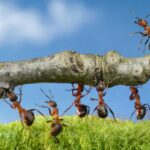Rural generalist Dr Louis Peachey had some sobering words after the weekend’s no vote.
Walking into a shop last Monday, Girrimay man Dr Louis Peachey did something he hadn’t done in around 15 years: he consciously took note of the threats, weapons and exits.
Speaking at the 2023 Rural Medicine Australia conference on Friday morning, Dr Peachey led a panel discussion with Indigenous colleagues about the impact of the referendum on an Indigenous voice to parliament and the resulting “no” vote.
One feeling that virtually all panel members addressed was the realisation that some of their peers, patients and colleagues had been among the “no” voters.
“The … irony is that if there’s a group of people who understand what it is to not be heard, it’s sure to be rural Australians,” Dr Peachey said.
“And yet, rural Australians voted exceptionally against letting Indigenous Australians have a voice.”
Dr Peachey said he and members of his close circle had changed their behaviour immediately after the results of the referendum came in, and that there was a pervasive sense of unease.
“There are colleagues of mine who just felt very exposed and very naked in any public circumstance,” he said.
Torres Strait Islander woman Dr Regina Waterhouse, who works in the remote Palm Island region, said she had spent the past week wondering which of her colleagues had voted against the voice.
It was hard to realise “that people you work with – your nurses, your [admin] staff, your other doctors – to think that they think that you shouldn’t have any input into the policies that that will change how things are for your mob … that you don’t deserve to have your voice at that sort of governance level,” Dr Waterhouse said.
Looking to the future, Dr Peachey said moving past the no vote requires non-Indigenous Australians to stand with and support Indigenous colleagues.
“For the last almost 50 years, we’ve had Indigenous people pushing [for progress] with our non-Indigenous brothers and sisters standing behind us in support,” he said.
“But it also meant that we were soaking up the shrapnel at the front.
“And last weekend, we really felt the shrapnel.
“We actually need our brothers and sisters to stand beside us, shoulder to shoulder, and walk with us, shoulder to shoulder.
“I’m not saying that they won’t throw some shrapnel at you either, they’re just less likely to do it.
“And it’s going to give us some protection with if you stand in line with us.”
Dr Peachey also used the opportunity to trace the connections between Indigenous health, data and the justice system.
Take an Aboriginal child in an overcrowded living environment, he said.
“If you’ve got 12 towels sitting on a towel rack that was made for three, then the chance that any of them will ever dry is unlikely,” Dr Peachey said.
“And then you’ll get infections passed from one to the other, so we get skin infections and eye infections and ear infections [passed around].
“Get the pus out of the ears and the eyes and the lungs and the skin and the kid has a chance.”
Around half of primary school aged children in the community of Yarrabah have chronic otitis media.
The nearest hospital with an ear, nose and throat specialist is only 10km away, Dr Peachey said, yet it takes an average of five years for children to get seen there.
A projected 80% of incarcerated Indigenous people are deaf, largely due to untreated chronic ear infections.
“By the time this kid is nine or 10 years of age, they know that they … are cut off from the Australian dream,” he said.
“They’ve got nothing to lose.”
Queensland’s government recently introduced tough new laws targeting youth offenders.
Stealing a car now comes with a maximum penalty of five years detention for juveniles and 10 for adults; the age of criminal responsibility in the state is 10 years.
Keeping a child in prison costs around $2000 per night, meaning that the cost of incarcerating a child for stealing a car quickly outweighs the cost of said car.
“Can we make that money actually do something much, much better?” Dr Peachey said.
“Something which will get a better outcome, which will actually make [the victim] feel like she was heard about her distress of having her car stolen, and give this child have a chance to become a productive member of society?”
This article was updated on 30/10/23: the minimum age of criminal responsibility in Queensland is 10 years old.





